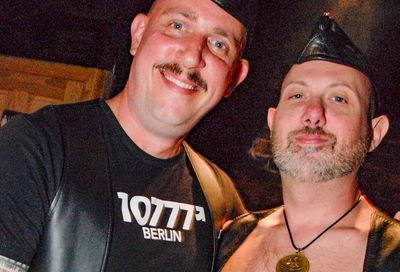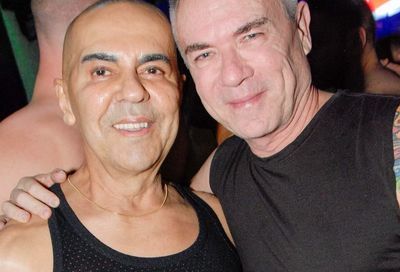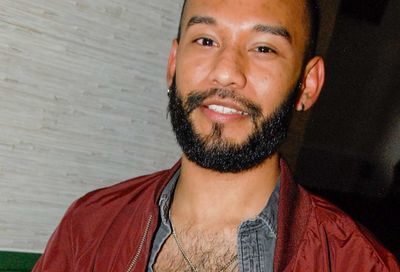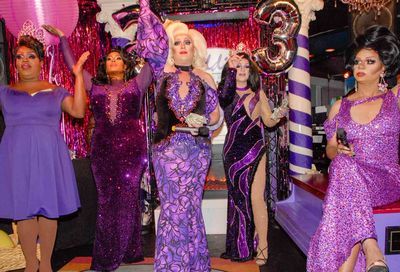Sowing Scorn
Commentary: Center Field
In a recent op-ed, black lesbian commentator Jasmyne Cannick wrote, ”Charles Knipp is a self-described 45-year-old fat, gay white man who believes he’s on a mission from God. A mission that involves mimicking Black women as his alter ego character Shirley Q. Liquor.” After describing what she calls Knipp’s ”blackface minstrel show,” Cannick writes, ”I blame gay America, from the political leaders to the club owners, for turning a blind eye to Knipp’s blatantly racist routines. We are the reason that his racist act continues to go nearly undetected on the race radar.”
Having heard an excerpt of Knipp’s act thanks to PamsHouseBlend.com, I think its obscurity is well deserved. Nonetheless, if Cannick wishes to call Knipp out as publicly as possible, that is her right. But it is a big jump from blaming club owners who book the act to blaming all of gay America. Cannick specifically targets white gays. She responds to Knipp’s rendition of ”a welfare mother with 19 kids who guzzles malt liquor and drives a Caddy” by making disparaging racial generalizations of her own.
It is certainly easy to understand Cannick’s anger at Knipp’s insulting portrayals as well as his method of defending himself from her criticism. Knipp recently photoshopped Cannick’s head onto a porn actress’s body and posted it on his Web site. Previously, Cannick received death and rape threats after her private e-mail and phone number were posted by Knipp’s promoter. Unfortunately, Cannick’s response hits innocent and guilty alike.
Cannick says accusingly to white gays, ”You usurp the Black Civil Rights Movement’s strategies and language.” This suggests that the black civil-rights movement is the exclusive property of African Americans, which could hardly stray further from the spirit of a movement whose legacy belongs to all Americans.
Cannick says to Knipp, ”Most people in your situation settle for surrounding themselves with Black friends, marrying someone Black, moving into a Black neighborhood, listening to hip hop, watching BET, eating Soul Food and voting for Barack Obama. Why don’t you give it a try and leave the act of being Black to those of us who are?”
For white people to have black friends, marry someone black, and vote for Barack Obama is merely a reflection of life in a multiracial society. It is happening in numbers far beyond what can be ascribed to a pathological desire for a race change, and merits contempt only if viewed through the prism of racial separatism.
Noting that RuPaul has defended Knipp, Cannick dismisses RuPaul by saying ”He’s as disconnected from Black America as Ward Connerly.” How can someone’s racial authenticity depend upon holding particular views? Speaking of Obama, he represents a healthy departure from this perpetual state-of-siege mentality.
Cannick’s throwdown with Knipp notwithstanding, there is no evidence that white people in blackface are the next big trend in entertainment. I had never heard of Shirley Q. Liquor until I read about her in an earlier piece by Cannick. In this respect, Cannick risks helping Knipp by increasing his notoriety.
In any event, it is unclear how people who have never even seen Knipp can be blamed for his depredations. Cannick’s implication is that Knipp’s ability to get paid for his performances proves that white gays in general are racist. Is Knipp playing to packed stadiums? It is peculiar that Cannick seeks to combat racism by venting her own racial hostility. If she wants respect from others, she should offer it herself.
Fortunately, a new generation is emerging, one that is less deferential to the old racial categories, and for whom racial mixing is increasingly commonplace. For those willing to drop their protective masks of cynicism, this social development might recall the redemption in Hawthorne’s House of the Seven Gables, where descendants of a judge from the Salem witch trials and of one of his victims dispel the old curse between the two families by falling in love.
Be that as it may, it is sad that Cannick would impugn the motives of those of us who have found love across the racial divide. Such attitudes help no one. Instead of the overused tactic of insisting that all white gays join her cause or be accused of racism, she should try something truly radical: treat people as individual human beings who are responsible for what they believe and say and do, the same as she.
Richard J. Rosendall is a writer and activist whose work has appeared on Salon.com and the Independent Gay Forum (www.indegayforum.org). He can be reached at rrosendall@starpower.net.
Support Metro Weekly’s Journalism
These are challenging times for news organizations. And yet it’s crucial we stay active and provide vital resources and information to both our local readers and the world. So won’t you please take a moment and consider supporting Metro Weekly with a membership? For as little as $5 a month, you can help ensure Metro Weekly magazine and MetroWeekly.com remain free, viable resources as we provide the best, most diverse, culturally-resonant LGBTQ coverage in both the D.C. region and around the world. Memberships come with exclusive perks and discounts, your own personal digital delivery of each week’s magazine (and an archive), access to our Member's Lounge when it launches this fall, and exclusive members-only items like Metro Weekly Membership Mugs and Tote Bags! Check out all our membership levels here and please join us today!





















